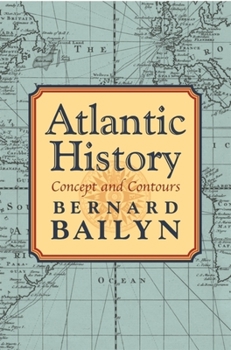Atlantic History: Concept and Contours
Atlantic history is a newly and rapidly developing field of historical study. Bringing together elements of early modern European, African, and American history--their common, comparative, and interactive aspects--Atlantic history embraces essentials of Western civilization, from the first contacts of Europe with the Western Hemisphere to the independence movements and the globalizing industrial revolution. In these probing essays, Bernard Bailyn...
Format:Hardcover
Language:English
ISBN:0674016882
ISBN13:9780674016880
Release Date:March 2005
Publisher:Harvard University Press
Length:160 Pages
Weight:0.60 lbs.
Dimensions:0.8" x 5.3" x 7.5"
Related Subjects
Americas Canada Europe Historical Study & Educational Resources Historiography History WorldCustomer Reviews
1 rating
Mapping Atlantic History
Published by Thriftbooks.com User , 18 years ago
After reading Bailyn's "ATLANTIC HISTORY: Concept and Contours" many of the more recent histories of North America I've read suddenly make a lot more sense, histories such as Alan Taylor's AMERICAN COLONIES, and WILLIAM COOPER' S TOWN, Linebaugh and Rediker's radical THE MANY-HEADED HYDRA, as well as Victoria Freeman's DISTANT RELATIONS to name just a few. Bailyn provides admirable summary of the how the "concept" of Atlantic history was launched -- by Walter Lippman in an essay justifying America's involvement in the Great War -- and then taken up by politicians in the wake of WWII as justification for the such organizations as NATO whose mission was to bind together more tightly the interests of the states of Western "Christendom" against those of the Communistic (and godless) East. Some historians supported this new notion with tendentious misreadings of history, but others of a more empirical bent began to undertake histories that looked beyond the old narratives of individual nation states and focused instead the commonalities of conquest and colonization in the Americas and Africa as practiced by Westerners. Bailyn dicusses the "contours" of Atlantic history by outlining the discipline's key findings, elucidating its key ideas, citing its indispensible texts, and historic techniques such as statistical investigations, e.g., the construction of a slave trade database compiled from actual records which demonstrate how the slave system served to underwrite the entire system of trade in the "inland sea" of the Atlantic. For the amateur historian, and perhaps even for the professional, Bailyn's "Notes" section is exceedingly useful as it offers a rich survey of the most important texts that have emerged in this rich and rapidly expanding field of study. Here are a couple of exemplary passages from the book. "In its first, original phase Atlantic history in the broadest sense is the story of the creation of a vast new marchland of European civilization, an ill-defined, irregular outer borderland, thrust into the world of indigenous peoples in the Western Hemisphere and in the outer reaches of the British archipelago. Life in this contested marchland was, literally, barbarous: that is in its initial stages it was, in large areas, a scene of conflict with alien people, alien in language and mores, hostile in purpose, savage and uncultivated. Europeans, native Americans and displaced Africans, all -- each from their own point of view -- saw it that way. For all, others were intent on destroying the civility -- European, native American, African -- that had once existed. Latin America, to paraphrase John Elliott, was no wilderness; the conquest made it that." Page 63. Bailyn's notes the barbarity of the conquerors did not vary by religious conviction or national origin. "Puritan New England was not different from Mexico or Peru. '"It was a fearful sight,"' the pious gentle Pilgrim leader William Bradford wrote of New England's Pequo




